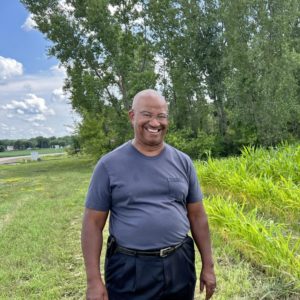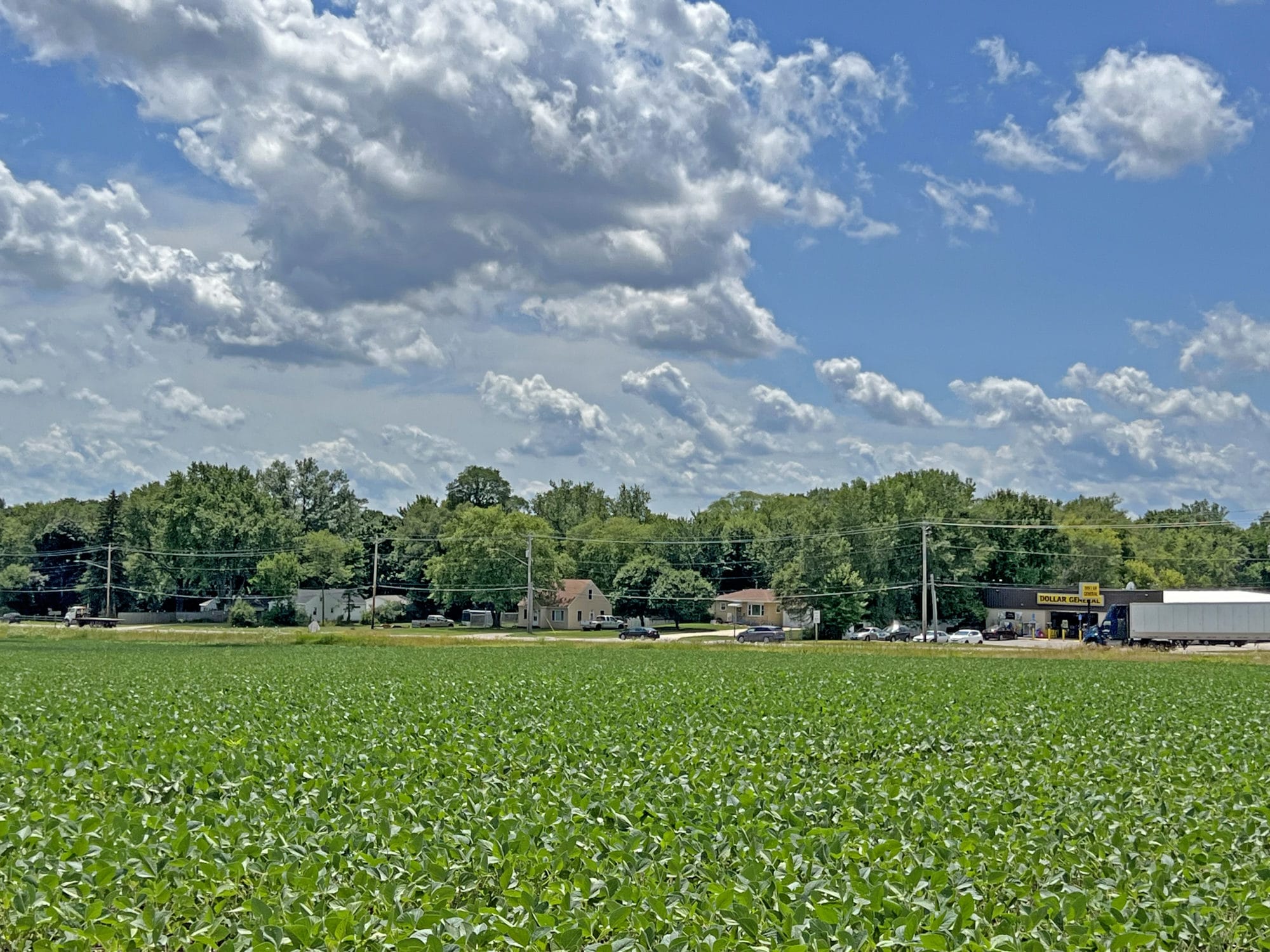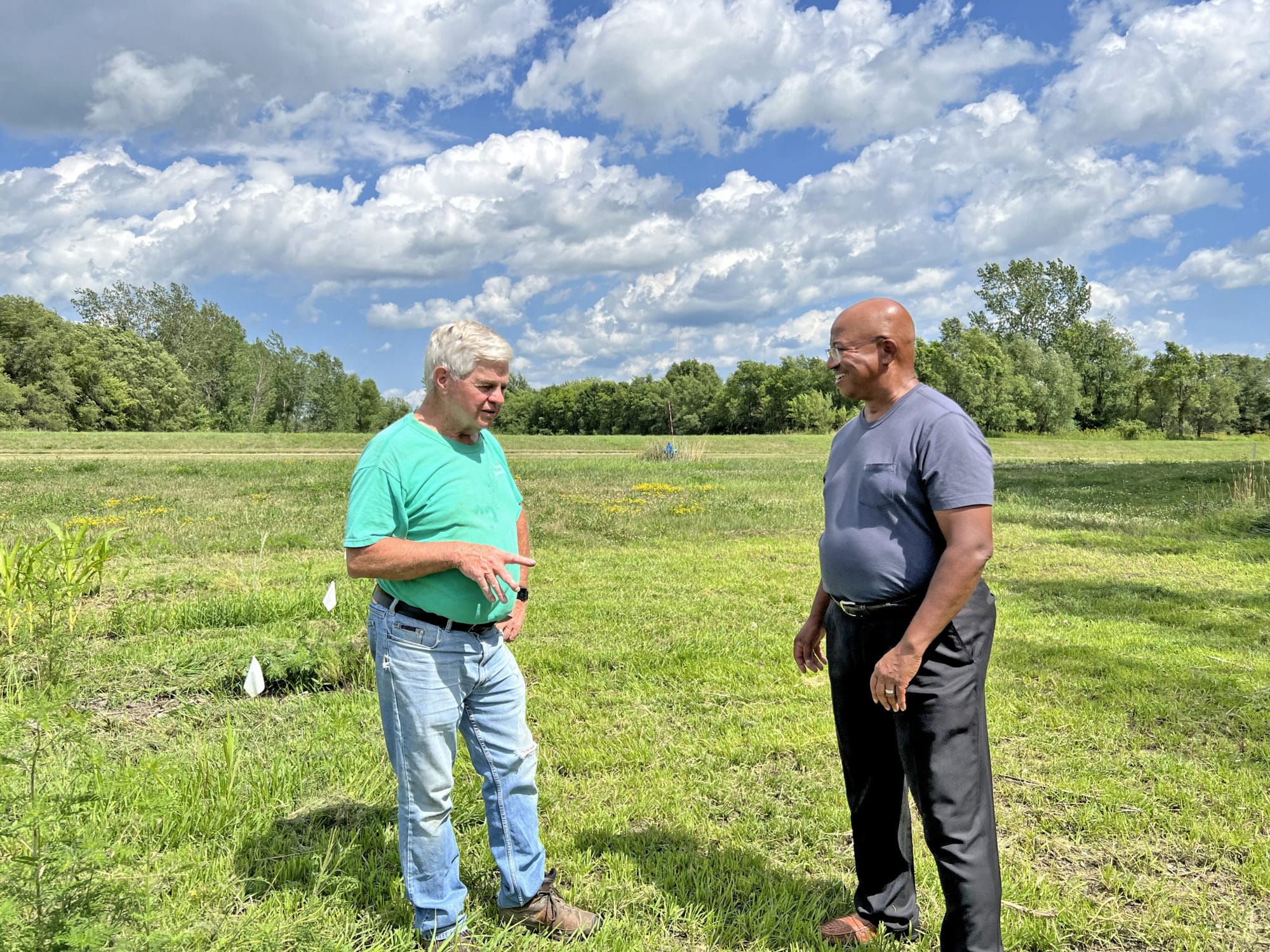Cultivating Diversity in the Heart of Waterloo
 Since the 1980s, Mike Cook and his family have worked to build a profitable business growing row crops, fruits and vegetables on a patchwork of smaller plots.
Since the 1980s, Mike Cook and his family have worked to build a profitable business growing row crops, fruits and vegetables on a patchwork of smaller plots.
Engineer and farmer Mike Cook has taken his career to immense heights but has always stayed grounded in the soils of Black Hawk County, Iowa.
A third-generation farmer, Mike’s grandfather, McKinley Cook, moved to Waterloo in 1925 and farmed in addition to working for the Illinois Central Railroad for 50 years. Around 1950, he sold about 10 acres to Mike’s dad, Mack, which Mack farmed on the side while working as a machinist for John Deere in Waterloo.
Mike’s path first took him to Baton Rouge, Louisiana, where he received his bachelor’s degree in mechanical engineering from Southern University and A&M College, a historically Black land-grant university, in 1980. He later went on to receive his master’s degree in industrial technology at the University of Northern Iowa. In the early 1990s, while working on his master’s degree, Mike also published research on hazardous waste disposal as part of a NASA fellowship he received.
Like his dad, Mike’s career then led him to John Deere, where he worked as an engineer for the first 15 years and then rose through the company. When he retired after 30 years, he held an upper management position and he holds three patents from his time there. But farming was never far away.
“Farming is dynamic,” Mike says. “There is always such variation in what you are going to be doing. There is always something to learn.”
Mike planted his first sweet corn in 1985, adding other produce that he and his family – including his wife, Liz Cook, and daughters Nicole and Kristina – sold locally. When his dad was looking to stop farming in the mid-1980s, Mike was just thinking of expanding. He took over his dad’s acres and continued to farm both row crops and produce on the side throughout his engineering career.
In 2008, Mike retired from John Deere and began teaching (he currently teaches an advanced manufacturing course on the TechWorks Campus in Waterloo). Mike now operates a highly diversified farm on 120 acres at Cook Family Farm, where he raises corn and soybeans along with a wide variety of fruit and vegetable crops. The farm is spread over 14 tracts of land across the Waterloo area. Some are parcels Mike’s grandfather and father bought, but many are new additions he and Liz have purchased. Managing many small plots requires good record-keeping, but Mike isn’t phased. Instead, he sees them as land access opportunities.
“That’s the thing,” he says. “Your average farmer isn’t going to want to get out here with all these trees, or farm in town with the Dollar General right across the street.”
Building the Business
When Mike first got back into farming, he says the business was not initially profitable. But now he and Liz have learned more and are always evaluating how their farm enterprises are performing. Liz is the farm’s accountant, and Mike credits her with keeping the business profitable and advising business decisions.
Of all his farm enterprises, his stand at the Waterloo Urban Farmers Market is one of his favorites. “I call it the ATM because the more vegetables you pick, the more they continue to bear,” Mike says. “You have to work for it.” He sells everything from green tomatoes, potatoes and zucchini to tender greens, okra and Crenshaw melons. The market stand is so popular, Mike often sells out of produce. A crowd favorite is Cook Family Farm’s early-maturity ‘Silver Queen’ sweet corn. In addition to standard summer vegetables, the Cooks also sell apples, pears, plums and their Concord grapes straight from the vine.
Corn is Mike’s favorite crop to grow, but he says he’s had to learn about growing row crops. One challenge has been finding people he could trust to advise him on inputs and pricing. In the past, Mike says businesses pushed extra fertilizer, hiked the prices and did not have his best interest in mind. Now, thanks to relationships with neighbors, who often drive by and check on his crops, and farmers like Shaffer Ridgeway, who farms with his family at Southern Goods and Grazin’ Cattle in Waterloo (and also serves on PFI’s board of directors), Mike is in a better place. “If it were not for Shaffer, I would not be farming,” Mike says. “He recommended an agronomist that helped cut my inputs by 40%.”
He also credits Bob Recker, a longtime friend, farmer and fellow former John Deere engineer. “You can’t be afraid to ask how to make it [as a farmer],” Mike says. “I’ve asked the people I farm with, point-blank, how they are making money.” He has also learned valuable lessons about how to wisely spend money. “Early on, I bought cheap seed,” Mike recounts. ‘When I talked to my neighbor, he said don’t save money on seed. Save it somewhere else, because you get what you paid for.”
Several years ago, Mike switched to no-till, and two years ago, he started adding cover crops to some acres. He has reduced his nitrogen use, and this fall, Mike plans to expand cover crops to all his row crop acres. On some acres, he’s also experimenting with wide-row corn, a practice that lets him plant crops like squash, turnips and cucumbers, among others, in the space between corn rows.
For these efforts – along with a commitment to mentoring others – Mike and his family received the Iowa Farm Environmental Leader Award at the 2023 Iowa State Fair.
Growing the Farm Into the Future
As he looks to the future, Mike hopes to expand the farm. He’d like to stay closer to his home base, but says buying land hasn’t been easy. In the past, he’s bought land from neighbors and at land auctions. But information on available land isn’t always easy to find, and it can get snapped up quickly. Recently, land near Mike’s home came up for sale but he didn’t get the chance to make an offer before it had sold.
He has also faced outright discrimination as a Black farmer. Mike recalls one land auction that was particularly disturbing. “I had the place bought at $16,000 and the auctioneer stopped the auction and said, ‘All right guys, I’m going to go around one more time and if you don’t bid, this guy right here is going to get a good deal,’” he recounts, noting how the auctioneer had pointed at him. Bidding resumed, and at $25,000 another interested party stopped and talked with Mike. They struck a deal, and Mike ultimately got the parcel for $25,000 while the other farmer bought $400,000 of land that day.
The strange encounter didn’t stop there. Mike says the auctioneer demanded to know, in front of everyone, how Mike planned to pay for the land. “I said I intend to pay with a check, and the auctioneer said, ‘I’ll take that check.’ But the man that just bought $400,000 worth of farm ground was not asked the same question in front of everyone, nor was he expected to hand over a check on the spot.”
It was clear to Mike that he was being treated differently because of his race. He also acknowledges that structural barriers exist for him as a Black farmer. In this instance, Mike was singled out and nearly lost the opportunity to purchase land. But he points to broader challenges he’s faced, from the attitudes of some bankers and service providers to finding information. “There is so much we as Black farmers don’t know,” Mike says. “So much information is withheld.”
Despite these barriers, Mike plans to continue accruing land and carving out space for himself as a farmer in Black Hawk County. Nicole, Mike’s eldest daughter, works as a realtor in both Iowa and Illinois, and his youngest daughter, Kristina, currently works as a pediatrician in Waterloo. He hopes they may work together to manage the farm and continue his farming legacy.


